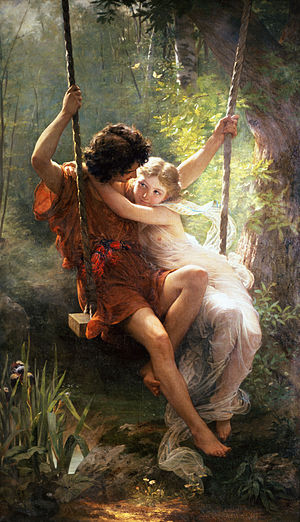Introduction to Psychology 1/IPSY103/Introduction to Evolutionary Psychology
Introduction to evolutionary psychology
If you have ever been on a first date, you’re probably familiar with the anxiety of trying to figure out what clothes to wear or what perfume or cologne to put on. In fact, you may even consider flossing your teeth for the first time all year. When considering why you put in all this work, you probably recognize that you’re doing it to impress the other person. But how did you learn these particular behaviors? Where did you get the idea that a first date should be at a nice restaurant or someplace unique? It is possible that we have been taught these behaviors by observing others. It is also possible, however, that these behaviors—the fancy clothes, the expensive restaurant—are biologically programmed into us. That is, just as peacocks display their feathers to show how attractive they are, or some lizards do push-ups to show how strong they are, when we style our hair or bring a gift to a date, we’re trying to communicate to the other person: “Hey, I’m a good mate! Choose me! Choose me!"
However, we all know that our ancestors hundreds of thousands of years ago weren’t driving sports cars or wearing designer clothes to attract mates. So how could someone ever say that such behaviors are “biologically programmed” into us? Well, even though our ancestors might not have been doing these specific actions, these behaviors are the result of the same driving force: the powerful influence of evolution. Yes, evolution—certain traits and behaviors developing over time because they are advantageous to our survival. In the case of dating, doing something like offering a gift might represent more than a nice gesture. Just as chimpanzees will give food to mates to show they can provide for them, when you offer gifts to your dates, you are communicating that you have the money or “resources” to help take care of them. And even though the person receiving the gift may not realize it, the same evolutionary forces are influencing his or her behavior as well. The receiver of the gift evaluates not only the gift but also the gift-giver's clothes, physical appearance, and many other qualities, to determine whether the individual is a suitable mate. But because these evolutionary processes are hardwired into us, it is easy to overlook their influence.
To broaden your understanding of evolutionary processes, this module will present some of the most important elements of evolution as they impact psychology. Evolutionary theory helps us piece together the story of how we humans have prospered. It also helps to explain why we behave as we do on a daily basis in our modern world: why we bring gifts on dates, why we get jealous, why we crave our favorite foods, why we protect our children, and so on. Evolution may seem like a historical concept that applies only to our ancient ancestors but, in truth, it is still very much a part of our modern daily lives.
